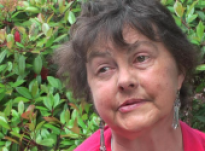Clare

Clare experienced a stroke while at home with her husband. She had blurred vision which she initially thought was a symptom of her diabetes. In addition to diabetes and stroke, Clare has had lifelong health issues including kidney problems, for which she is undergoing dialysis.
Clare is a 50 year old retired catering manager. She experienced a stroke at age 46. Her ethnic background is White British.
More about me...
Clare’s other health problems include osteoporosis and previous wrist fractures. Despite on-going health issues and treatment problems, Clare is determined to improve and avoid further stroke. She has become even more careful in managing her diabetes, specifically her blood sugar levels, since her stroke and urges other diabetics to do the same.
Clare was at home working with her husband when her eyesight went blurry, She initially thought this was related to her diabetes.
Clare was at home working with her husband when her eyesight went blurry, She initially thought this was related to her diabetes.
Clare spoke regularly to her father which helped her recover her speech.
Clare spoke regularly to her father which helped her recover her speech.
Clare wrote letters to her aunt with her non-dominant hand as a form of therapy.
Clare wrote letters to her aunt with her non-dominant hand as a form of therapy.
Clare talks about her experience with having multiple health problems since a young age.
Clare talks about her experience with having multiple health problems since a young age.
And of course you’d had a kidney transplant as well back in the days...
Well yes I had, that’s true, but also when, after I had [name of daughter] I think it was before I went on dialysis – yes, it was before I was on dialysis, I had to have a hysterectomy when she was just two and, because after I had her I carried on being sick and they couldn’t understand why. I’d had morning sickness throughout the pregnancy anyway, but I carried on being sick so, I mean, you know, it couldn’t have been - but of course the kidney people said no, it wasn’t the kidneys. It was my hormones. And also I was getting very heavy bleeding, so basically they gave me a hysterectomy. But the hysterectomy went slightly wrong and - oh I don’t know, I had one thing after another - and then when I was in intensive care after the hysterectomy they had to put me onto dialysis for two weeks. And then suddenly my kidney went into overdrive, like it was on a honeymoon period or something, and worked for six months, and then suddenly it went downhill and I had to go on dialysis at my daughter’s third birthday. So in fact I went into hospital, you know, over her third birthday I was actually in hospital having the tubes fitted really because I was going to go on CAPD [continuous ambulatory peritoneal dialysis] which is a system you can have at home.
I don’t really think about my conditions. Apart from the walking, not being able to walk. I think that’s the only thing that annoys me at the moment, because that does actually annoy me that I can’t walk and I have to rely on others to do things for me and I mean [name of husband], because we’ve got a step between our sitting room and kitchen, I’m usually in the sitting room, he has to do all the cooking. I mean he used to be a chef, but even so he still has to do the nightly cooking and everything so.
Clare has an artificial leg which was not treated properly in hospital. She developed sores and was unable to practice walking.
Clare has an artificial leg which was not treated properly in hospital. She developed sores and was unable to practice walking.

